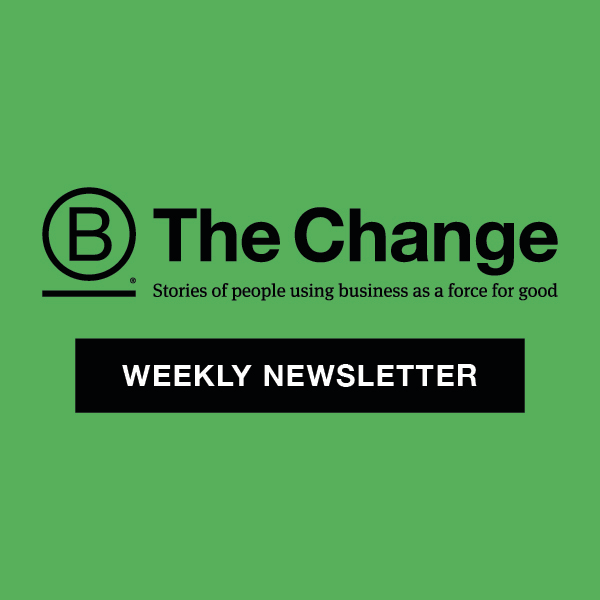Providing Equitable Access to Reproductive Health Care
June 8, 2022
Public Advocacy and Internal Policy Adaption to Support Employees
In early May 2022, a leaked U.S. Supreme Court draft opinion indicated that an upcoming ruling could overturn Roe v. Wade. The Roe v. Wade decision has provided women with a right to abortion since its passage in 1973. Because access to health care is typically tied to employment in the U.S., repealing Roe v. Wade — and the access to reproductive health services it protects — is undoubtedly a business issue. The decision should concern any business leaders whose values include justice and anti-racism and who hold themselves accountable to all stakeholders.
In light of this likely repeal, mission-driven businesses — especially U.S.-based Certified B Corporations — should be concerned about their ability to support a key stakeholder group: their employees. Repealing Roe v. Wade would impinge on the rights of workers, and would limit businesses’ ability to live in alignment with their values of justice, equity, diversity, and inclusion.
The overturn of Roe v. Wade would also worsen racial disparities. People of Color — Black women in particular — experience medical discrimination, higher rates of maternal mortality, and greater income inequality than their white counterparts. Restricting abortion access only compounds these factors, further entrenching systemic racism and barriers to opportunities, career paths, and life experiences.
B Corps can both step in to fill the gaps that could be left by the government with this repeal and advocate for the policies they believe best support their employees. Many B Corps are not waiting for the official ruling before getting to work and finding solutions. B The Change reached out on the B Hive, the social platform for B Corps, to learn what companies are doing. We’ve collected some ideas for advocacy and action to help other companies prepare and adapt.

Subscribe to B The Change Weekly
Learn more about this growing movement of people using business as a force for good, and sign up to receive the B The Change Weekly newsletter for more stories like this one, delivered straight to your inbox once a week.
Speaking Up for Equitable Access to Health Care Services
Several B Corps have made public statements and are actively working on addressing this potential ruling reversal:
- Ben & Jerry’s, Patagonia, and Amalgamated Bank are co-convening an online conversation on reproductive rights and abortion access from noon to 1 p.m. ET on Wednesday, July 13.
- Planta, a Florida-based advertising firm, is helping clients with pro bono campaigns to support and raise their voices supporting abortion access. They are working with Planned Parenthood Global and Amnesty International as well.
- East Fork Pottery committed to donating 20% of sales from Mother’s Day Weekend to the Carolina Abortion Fund “to support their life-affirming work.” The company also made a suggestion on Facebook and Twitter to set up a recurring monthly donation to regional abortion funds.
- Ben & Jerry’s issued a statement via Twitter opposing the repeal and highlighting the disproportionate impact on vulnerable communities.
- Amalgamated Bank is a signatory of numerous initiatives including Don’t Ban Equality, Pregnant Workers Fairness Act, and the Amicus Brief for the Center of Reproductive Rights. The bank will endorse legislative proposals to make the right to abortion a constitutional right.
- Culture Amp, Higher Ring, and dozens of other B Corps have also signed the Don’t Ban Equality pledge.
Adapting Policy to Provide Equitable Access to Reproductive Care
B Corps also shared that they are reviewing internal policies to be ready to adapt if the overturn is released. Examples of what they have put in place include:
- Amalgamated Bank announced it will cover travel expenses for employees and their dependents who need to travel out of state to access reproductive health care. This includes plane fare, gas money, hotel, and meal expenses. Childcare expenses are also reimbursed. Amalgamated Foundation launched the Critical Reproductive Access Fund to deploy resources to organizations responding to the access crisis. It is a grassroots fundraising program, led by employees and strategically guided by field partners.
- Culture Amp’s health plans cover abortion, but to ensure access for employees in all states, the company is providing a new benefit to enable employees to receive up to $2,000 in reimbursements for travel and associated expenses. Culture Amp is working with partners and peers to consider how to minimize the disclosure of information in the reimbursement process, especially within the context of the manager-employee relationship; ensure that this information and employees are protected when accessing abortion-related services; identify and communicate any tax implications of the benefit; and evolve its practices in the event that additional laws further restrict access. (This information is all available in a public post on Culture Amp’s site.)
- PIPs Rewards LLC shared that some of its team members live in states that could severely restrict access to reproductive health care. PIPs is updating its personnel manual to note it will cover travel expenses for employees and their dependents who need to travel out of state to access reproductive health care.
- HigherRing has ensured all of its health care plans cover abortion services. HigherRing will also cover travel and stay for any of its employees or their dependents/partners who need to access abortion services.
- Wordbank sent an internal email to staff to reaffirm its support for reproductive health care access and bodily autonomy. The company is reviewing its health care coverage amendments and announced it will cover paid time off and travel expenses for people who need to travel out of state to access safe reproductive health care services.

Stakeholder Capitalism: The Systemic Change Our Economy Needs
A new impact economy is being built, one where businesses prioritize and consider their impact on all the stakeholders they impact — including communities, workers, customers, and the environment. Download this free report to learn how the stakeholder model as practiced by B Corps is gaining global traction and validation.
Aligning Company Actions with Your Company’s Mission
We also wanted to know why B Corps chose to take the steps they did — and how that supports their mission and values. Here’s what some companies had to say:
Amalgamated Bank: “As America’s socially responsible bank and the largest B Corp banking institution in the country, Amalgamated Bank has a long history of supporting reproductive rights. We are a Planned Parenthood Action Fund Corporate Advisory Board funding member, and have partnered with Planned Parenthood of New York City in an affinity program to raise funds to protect women’s rights and build innovative lending solutions to support Planned Parenthood affiliates across the country. We only donate money to pro-choice political candidates.
Amalgamated Bank’s mission is to be a voice for those who don’t feel heard and stand up for social justice, such as reproductive healthcare access, gender equity, racial justice, climate, and voting, and to empower organizations and individuals to advance positive change.”
Higher Ring: “We hire in many of the states that will be affected. Our mission is to create great sustainable jobs, and it’s not sustainable if a member of our community is forced to carry an unplanned pregnancy to term. As moms, we know that bringing a child into this world comes with huge economic costs and needs to be decided by the pregnant person themselves in conjunction with professional assistance from their trusted medical professionals. Many of these laws will also put women’s lives at risk and are not science-based.”
Wordbank: “We know this is a difficult conversation and it’s not something we enter into lightly. But as a marketing localization agency with a global reach, we’re in the business of connection and inspiring action. Wordbank is also female-led, with a female CEO, a global executive team with 75% female representation, a global management team that’s 80% female, and a workforce that is 67% female. So we feel this is an important topic to discuss.
Even with the economic and employment gains achieved by women over the past several decades, restricting access to comprehensive reproductive care threatens the health, independence, and economic stability of our people. This disproportionately affects women of color, putting their well-being at risk and impedes diverse hiring pipelines. Simply put, restricting reproductive health care goes against our values and is bad for our community. It threatens our ability to build a diverse and inclusive workforce and protect the well-being of all the people who keep our business thriving day in and out.”
Contact your members of Congress to share your thoughts on this issue.
-

-

-

Business Strategy
5 Lessons on Business Resilience and Stakeholder Engagement From the Great Recession
Read More -

Sign Up for our B The Change Newsletter
Read stories on the B Corp Movement and people using business as a force for good. The B The Change Newsletter is sent weekly.
